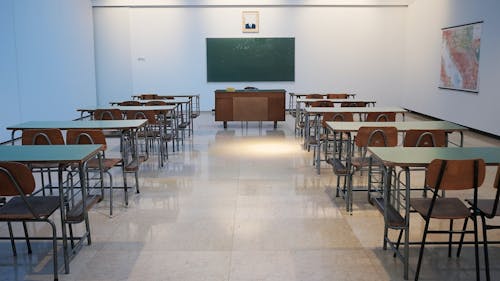Students, faculty say that hybrid instruction is preferred to virtual learning

After offering hybrid instruction throughout the past academic year, the University will continue to do so, according to its operating status website.
Hybrid learning was implemented during this past school year as a safety measure during the coronavirus disease (COVID-19) pandemic as this method allowed students and faculty to return to campus with limited in-person interactions after being completely virtual for the 2020-2021 school year.
Many courses like Elementary Arabic and General Chemistry required both in-person and online class meetings, while others had optional recitations with online lectures.
Although hybrid learning became increasingly common during the pandemic, it was first introduced at the University in 2008, according to a press release from the English Department.
During the Spring 2008 semester, faculty members were trained on running successful online courses that included an in-person component. Twenty hybrid courses were officially offered at the University during the following semester, according to the release.
At that time, students reacted positively to the new method in comparison to complete in-person instruction due to the convenience and the enrichment of classroom experience in hybrid learning.
Karolina Jamiolkowska, a School of Arts and Sciences first-year, said that she has had a positive experience with hybrid learning at Rutgers, especially when compared to the mostly negative responses to virtual learning during the 2020-2021 school year.
“I think the virtual option is always a plus, especially in extenuating circumstances when a person may not be able to come to class, like being sick or having something come up last minute,” she said. “I believe having the virtual option is more inclusive and has made many events and classes more accessible for all students.”
Jamiolkowska said that she also appreciates how many classes are now recorded and posted to the online Canvas site so if a student is sick, they can stay home and not worry about missing important class material.
Heidi Nicklaus, the residence life coordinator for the Henderson Apartments and Jameson, Katzenbach and Woodbury Bunting-Cobb Halls on Douglass campus, said that she enjoyed her opportunity to teach an in-person class this year.
The course, Students in Transition Seminar, required one in-person class meeting each week as well as an asynchronous component, she said.
Nicklaus said that she expected the University to switch to virtual learning at some point, especially after winter and spring break when students were traveling to and from campus.
She said she thought that administration would consider virtual learning to mitigate potential spikes in COVID-19 cases but expected that other activities and events would remain in-person and would require attendees to wear masks.
Though she was not involved in the decision of having activities in-person, Nicklaus said that she was able to see that student engagement improved greatly.
“Knowing how we operated when we were completely virtual, it was very clear that people were craving in person interaction,” she said.
Jamiolkowska said that despite her positive experience with hybrid learning, she prefers in-person instruction for classes, events and club meetings due to the ability to interact with other students.
Liam Schroeder, a School of Environmental and Biological Sciences first-year, said that he thinks the status of the Fall 2022 semester will be determined by Rutgers’ attitude toward possible virus surges.
“I think that Rutgers' attitude toward next semester will entirely depend on the (COVID-19) spike this summer,” he said. “I’d guess it will not be as bad as previous ones but will still merit a week buffer period of online classes.”



